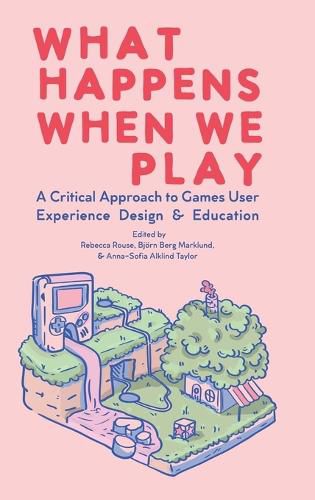Readings Newsletter
Become a Readings Member to make your shopping experience even easier.
Sign in or sign up for free!
You’re not far away from qualifying for FREE standard shipping within Australia
You’ve qualified for FREE standard shipping within Australia
The cart is loading…






This title is printed to order. This book may have been self-published. If so, we cannot guarantee the quality of the content. In the main most books will have gone through the editing process however some may not. We therefore suggest that you be aware of this before ordering this book. If in doubt check either the author or publisher’s details as we are unable to accept any returns unless they are faulty. Please contact us if you have any questions.
What Happens When We Play: A Critical Approach to Games User Experience Design & Education brings together research and reflection from both faculty and graduate students involved in University of Skoevde's Games User Experience (GUX) Master's program, launched in 2020. The collection shares insights from the new GUX curriculum, which takes a critical-making approach, combining practical projects done in collaboration with game studios, critical cultural theory and history, and design theory and hands-on work in the practice of games user experience design and analysis. The seemingly simple question posed by our title, What Happens When We Play, opens up a range of complex possibilities for inquiry, all of which we argue fall under the purview of contemporary GUX that centers our focus on the player. For example, who do we mean by "we" in our title? Who is playing, and who is left out? Who wishes to join in but cannot, and who may join but chooses not to? Why? In addition, our title opens up questions about the scope of play - when can we be said to be "in" the game? Where does the play experience begin, and end? What happens just before that, and what happens after? This perspective on games and the user experience is intended to stretch the boundaries of the field, encouraging GUX students, researchers, and workers to question both more deeply and broadly as they aim to both understand and create player experience.
$9.00 standard shipping within Australia
FREE standard shipping within Australia for orders over $100.00
Express & International shipping calculated at checkout
This title is printed to order. This book may have been self-published. If so, we cannot guarantee the quality of the content. In the main most books will have gone through the editing process however some may not. We therefore suggest that you be aware of this before ordering this book. If in doubt check either the author or publisher’s details as we are unable to accept any returns unless they are faulty. Please contact us if you have any questions.
What Happens When We Play: A Critical Approach to Games User Experience Design & Education brings together research and reflection from both faculty and graduate students involved in University of Skoevde's Games User Experience (GUX) Master's program, launched in 2020. The collection shares insights from the new GUX curriculum, which takes a critical-making approach, combining practical projects done in collaboration with game studios, critical cultural theory and history, and design theory and hands-on work in the practice of games user experience design and analysis. The seemingly simple question posed by our title, What Happens When We Play, opens up a range of complex possibilities for inquiry, all of which we argue fall under the purview of contemporary GUX that centers our focus on the player. For example, who do we mean by "we" in our title? Who is playing, and who is left out? Who wishes to join in but cannot, and who may join but chooses not to? Why? In addition, our title opens up questions about the scope of play - when can we be said to be "in" the game? Where does the play experience begin, and end? What happens just before that, and what happens after? This perspective on games and the user experience is intended to stretch the boundaries of the field, encouraging GUX students, researchers, and workers to question both more deeply and broadly as they aim to both understand and create player experience.